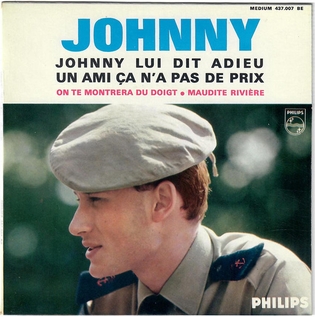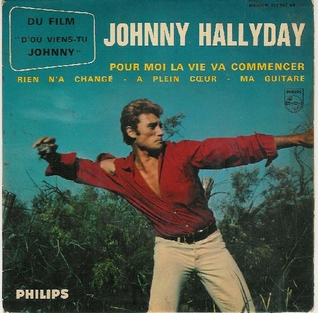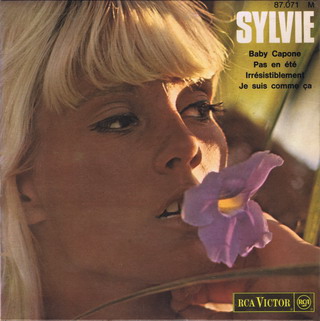
Sylvie Vartan is a Bulgarian-French singer and actress. She is known as one of the most productive and tough-sounding yé-yé artists. Her performances often featured elaborate show-dance choreography, and she made many appearances on French and Italian TV.

"Twist and Shout" is a 1961 song written by Phil Medley and Bert Berns. It was originally recorded by the Top Notes, but it did not become a hit in the record charts until it was reworked by the Isley Brothers in 1962. The song has been covered by several artists, including the Beatles, Salt-N-Pepa, The Astronauts and Chaka Demus & Pliers, who experienced chart success with their versions.

"Change the World" is a song written by Tommy Sims, Gordon Kennedy, and Wayne Kirkpatrick and recorded by country music artist Wynonna Judd. A later version was recorded by English singer Eric Clapton for the soundtrack of the 1996 film Phenomenon. Clapton's version was produced by R&B record producer Kenneth "Babyface" Edmonds.

"Rhythm of the Rain" is a song performed by The Cascades, released in November 1962 in the US and on January 25, 1963 in the UK. It was written by Cascades band member John Claude Gummoe. On March 9, 1963, it rose to number 3 on the Billboard Hot 100, and spent two weeks at number 1 on Billboard's Easy Listening chart. Billboard ranked the record as the number 4 song of 1963.

"Power to All Our Friends" is a song by Cliff Richard which was chosen as the British entry to the Eurovision Song Contest 1973, by a postal vote which was decided by BBC viewers after Richard performed six contending songs on A Song For Europe, featured on Cilla Black's BBC1 Saturday evening show Cilla. The runner-up song was "Come Back Billie Jo", written by Mitch Murray and Tony Macaulay, which was included as the B-side on the single. "Power to All Our Friends" came third in the Eurovision Song Contest.

"Oh, Pretty Woman", or simply "Pretty Woman", is a song recorded by Roy Orbison, written by Orbison and Bill Dees. It was released as a single in August 1964 on Monument Records and spent three weeks at number one on the Billboard Hot 100 from September 26, 1964, the second and final single by Orbison (after "Running Scared" to top the US charts. It was also Orbison's third single to top the UK Singles Chart.

"My Whole World Is Falling Down" is a song written by Bill Anderson and Jerry Crutchfield and performed by Brenda Lee. Its chorus is based on the nursery rhyme "London Bridge Is Falling Down". The song reached #8 on the Adult Contemporary chart and #24 on the Billboard Hot 100 in 1963. The song is featured on her 1964 album, By Request. The song also reached #16 in Australia.

"La plus belle pour aller danser" is a song by Sylvie Vartan from the 1964 French feature film Cherchez l'idole.

"Un ami ça n'a pas de prix" is a song by French singer Johnny Hallyday. It was released on an EP titled "Johnny lui dit adieu / Un ami ça n'a pas de prix" in January 1965.

"Makin' Love" is a song written and originally released by American country singer Floyd Robinson. He released it as a single in 1959 and was featured on his self-titled debut album the following year.

"Comme un garçon" is a song by Sylvie Vartan from her 1967 album Comme un garçon. It was also released on an EP and as a single.

"Tous mes copains" is a song by Sylvie Vartan from her 1962 album Sylvie. It was also released on an EP and as a single that year.
"Ride the Lightning" is a song written by John Kongos and Peter Leroy and originally released by John Kongos in 1975.

"Gee Baby" is a song originally released by the duo Joe & Ann. It was co-written by Joe Joseph and Alvin Tyler, arranged and produced by Tyler, and recorded in New Orleans, possibly with Mac Rebennack on keyboards. Released as a single in 1959, it peaked at no. 14 on U.S. Billboard's R'n'B chart, called Hot R&B Sides at the time.

"Pour moi la vie va commencer" is a song by written by French singer-songwriter Jean-Jacques Debout and performed by French singer Johnny Hallyday. It was released in October 1963, coinciding with the release of the film "D'où viens-tu Johnny", starring Hallyday and fellow singer and future wife Sylvie Vartan, of which the song is featured on.

"Par amour, par pitié" is a song by Sylvie Vartan. It was released on an EP in December 1966 and then as the lead single off of her 1967 studio album 2'35 de bonheur.

"Irrésistiblement" ("Irresistibly") is a song by French pop singer Sylvie Vartan, released in July 1968. Co-written by Jean Renard and Georges Aber, the song was released as the lead single off of Vartan's 1968 studio album La Maritza. The song was also adapted into multiple other languages, most notably in Italian as "Irresistibilmente".
"George (Disco Tango)" is a song, originally released in English in 1977 by German female singer Pat Simon (born 1949) after a 5-year break in her career.

"Sha La La" is a song written by Robert Mosely and Robert Taylor. The Shirelles released the original version of the song as a single in March 1964 in the US, reaching #15 on the U.S. R&B chart and #69 on the U.S. pop chart. A cover by the British pop group Manfred Mann would follow that October, being the most notable version of the song, reaching Number 3 on the UK Singles Chart and Number 12 on both the U.S. pop chart and the RPM charts in 1965. Around the same time as the release of Manfred Mann's version, the song was adapted into French by Georges Aber and performed by French pop singer Sylvie Vartan, whose version was released as a single in October 1964 and reached Number 14 on the French Belgian charts.
This is the discography of French singer Michel Polnareff.


















